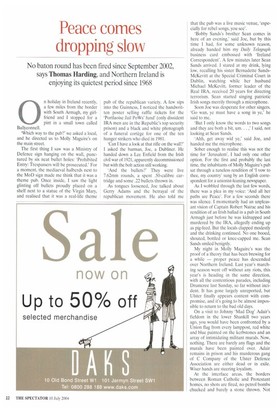Peace comes
dropping slow No baton round has been fired since September 2002, says Thomas Harding, and Northern Ireland is enjoying its quietest period since 1968
n holiday in Ireland recently, a few miles from the border with South Arrnagh, my girlfriend and I stopped for a pint in a small town called Ballyconnell, 'Which way to the pub?' we asked a local, and he directed us to Molly Maguire's on the main street.
The first thing I saw was a Ministry of Defence sign hanging on the wall, punctured by six neat bullet holes: Prohibited Entry: Trespassers will be prosecuted.' For a moment, the mediaeval halberds next to the MoD sign made me think that it was a theme pub. Once inside, I saw the light glinting off bullets proudly placed on a shelf next to a statue of the Virgin Mary, and realised that it was a real-life theme pub of the republican variety. A few sips into the Guinness, I noticed the handwritten poster selling raffle tickets for the Portlaoise Jail PoWs' fund' (only dissident IRA men are in the Republic's top security prison) and a black and white photograph of a funeral cortege for one of the ten hunger strikers who died in 1981.
'Can I have a look at that rifle on the wall?' I asked the barman, Joe, a Dubliner. He handed down a Lee Enfield from the Irish civil war of 1921, apparently decommissioned but with the bolt action still working.
'And the bullets?' They were live 7.62mm rounds, a spent .50-calibre cartridge and some .22 bullets thrown in.
As tongues loosened, Joe talked about Gerry Adams and the betrayal of the republican movement. He also told me that the pub was a live music venue, 'especially for rebel songs, you see'.
'Bobby Sands's brother Sean comes in here of an evening.' said Joe, but by this time I had, for some unknown reason, already handed him my Daily Telegraph business card embossed with 'Ireland Correspondent'. A few minutes later Sean Sands arrived. I stared at my drink, lying low, recalling his sister Bernadette SandsMcKevitt at the Special Criminal Court in Dublin, watching while her husband Michael McKevitt, former leader of the Real IRA, received 20 years for directing terrorism. Sean started singing patriotic Irish songs merrily through a microphone.
Soon Joe was desperate for other singers. 'Go wan, ye must have a song in ye,' he said to me.
'But I only know the words to two songs and they are both a bit, urn, . ,' I said, not looking at Sean Sands.
`Ahh, get away wid ye,' said Joe, and handed me the microphone.
Sober enough to realise this was not the time for 'Jerusalem', I had only one other option. For the first and probably the last time, the inhabitants of Molly Maguire's pub sat through a tuneless rendition of 'I vow to thee, my country' sung by an English correspondent for a unionist-leaning newspaper.
As I wobbled through the last few words, there was a plea in my voice: 'And all her paths are Peace'. For a few seconds there was silence. I momentarily had an unpleasant vision of Captain Robert Nairac and his rendition of an Irish ballad in a pub in South Armagh just before he was kidnapped and murdered by the IRA, allegedly ending up as pig-feed. But the locals clapped modestly and the drinking continued. No one booed, shouted, bottled or knee-capped me. Sean Sands smiled benignly.
My night in Molly Maguire's was the proof of a theory that has been brewing for a while — proper peace has descended over Northern Ireland. Last year's marching season went off without any riots, this year's is heading in the same direction, with all the contentious parades, including Drumcree last Sunday, so far without incident. It has gone largely unreported, but Ulster finally appears content with compromise, and it's going to be almost impossible to return to the bad old days.
On a visit to Johnny 'Mad Dog' Adair's fiefdom in the lower Shankill two years ago, you would have been confronted by a Union flag from every lamppost, red white and blue painted on the kerbstones and an array of intimidating militant murals. Now, nothing. There are barely any flags and the murals have been painted over. Adair remains in prison and his murderous gang of C Company of the Ulster Defence Association are either dead or in exile. Wiser hands are steering loyalism.
At the interface areas, the borders between Roman Catholic and Protestant homes, no shots are fired, no petrol bombs chucked and barely a stone thrown. Not many know it. but a senior IRA 'military' commander and a UDA leader will speak to each other on mobile phones if trouble looms. There has been no baton round fired since September 2002; the police are now mainly driving in 'soft-skin' vehicles rather than the ubiquitous armoured Land-Rovers (170 of which were shipped to Iraq). The army chief in Northern Ireland has signed off two battalions of infantry, and although there still remain more soldiers here (12,500) than in Iraq (9,000), no soldier has been killed since 1997, no policeman since 1998.
Even Ian Paisley's DUP appears to be eyeing up Sinn Fein like sulky teenagers across the dance floor, waiting to do a deal to resurrect Stormont. The party still manages to keep the anti-republican pot boiling with its refusal ('never, never, never') to enter talks with Sinn Fein until the IRA effectively surrenders. At the same time, there are rumours that secret contacts have been made with republicans for a deal to be done in the autumn.
As it approaches the second anniversary of two years of direct rule from Westminster, the province is enjoying its quietest period since 1968. So what has happened to republican terrorists, the old regulars of Molly Maguire's? They are by no means a spent force — the security services know only too well that the Provos still have the contacts and means to get a container-load of weapons from Eastern Europe — it's just that most seem content to slip quietly out of sight, to nurture the memory of their vile deeds over a pint. Others are now so tied to Sinn Fein and its idea of a political process that they are no longer a military threat. 'A united Ireland.' a former ardent republican told me, 'is not worth the tip of the little finger of one man.'
And what of the other republican terrorist movements? The brutish INLA sticks to maiming recalcitrant teenagers and dealing drugs. the Continuity IRA has suffered many arrests and has little military capability — which leaves the Real IRA, perpetrators of the Omagh atrocity. They are desperately clinging to the belief that a united Ireland can be achieved by a 'military' strategy, but their most pressing concern is to leave jail in a car rather than in a coffin.
Perhaps if the old guard were not in prison, our night in Ballyconnell. Co. Cavan, might have ended on a different note. As it was, a few hours later we stood outside, with a parting gift — a republican poster containing the lyrics of 'The Fields of Athenry' — tucked under my arm.



























































 Previous page
Previous page